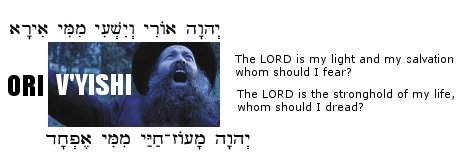|
August 2009 Updates
Upcoming Fall Holidays
[ Note: For current site updates, please scroll down past this entry.... ]
Preparations for the High Holidays begin a month in advance. This year, the 40-day season of teshuvah (return or repentance) runs from Elul 1 (Aug. 19th) until the end of Yom Kippur (Sep. 27th). Five days after Yom Kippur is the joyous week-long festival of Sukkot ("Tabernacles"), which is immediately followed by the celebration of Simchat Torah. Here is a simple diagram to help you visualize this season of the Jewish calendar:
The following is a list of the fall holiday dates according to the Gregorian Calendar. Note that according to the custom of the Jewish Calendar all holidays begin at sundown:
- ROSH HASHANAH 5770 - FRI. SEPT. 18th
Rosh Hashanah (ראש השנה) begins Friday, September 18th this year (this is a Shabbat). According to traditional Jewish thinking, this holiday commemorates the creation of mankind by God. The Mishnah (earlier part of the Talmud) refers to Rosh Hashanah as the "Day of Judgment" (Yom ha-Din) since all of creation owes allegiance to the Creator and is accountable to Him. The Name Elohim (אֱלהִים) revealed in Genesis 1:1 bespeaks God as the Creator and Judge of the universe (the Name YHVH, on the other hand, reveals God's compassion, as the One who intimately relates to humanity and breathes into us the breath of life (Gen. 2:4)). In Jewish tradition on Rosh Hashanah we stand before God as our personal Creator and Judge. Many Messianic Jews believe that the sound of the shofar on Rosh Hashanah is a symbol of the rapture (ἁρπάζω) of the followers of the Messiah.

- YOM KIPPUR - SUN. SEPT. 27th
Yom Kippur begins an hour before sundown on Sunday, September 27th. The 25 hour fast runs until an hour past sundown on Monday, September 28th. This is perhaps the most important holiday of the Jewish Year and holds tremendous prophetic significance. It is considered a mitzvah to eat a sacred meal with loved ones (called Seudat Mafseket, a meal of cessation), just before the fast begins....

The sound of the shofar on Yom Kippur is called gedolah, since it signifies the "sealing of the books" for the coming year.... Yom Kippur prophetically pictures the "Day of the LORD" or the Day of Judgment in Acharit Ha-Yamim (the End of Days).
- SUKKOT - FRI. Oct. 2nd - Fri. Oct. 9th
Five days after Yom Kipppur marks the start of the seven-day festival of Sukkot (referred to as "Tabernacles" in the Christian tradition). It can be argued that Sukkot is the climax of all the festivals in Scripture.... Everything leads to it as a culmination in God's prophetic plan. Sukkot concludes with an additional holiday called "Shemini Atzeret," on Friday, October 9th.

Note: The Torah Reading Cycle is suspended for the holiday week of Sukkot as well as for Shemini Atzeret (sometimes referred to as the eighth day of Sukkot). Sukkot, Hoshana Rabbah, and Shemini Atzeret Torah readings are from Leviticus 22-23, Numbers 29, and Deuteronomy 14-16. These readings detail the laws of all of the mo'edim or "appointed times" on the Jewish calendar and include the mitzvot regarding the festival of Sukkot.
- SIMCHAT TORAH - SAT. Oct. 10th
Simchat Torah ("Joy of Torah") immediately follows the festival of Sukkot (Shemini Atzeret evening service). On Simchat Torah we conclude, and begin anew, the annual Torah-reading cycle. First we read the Torah section of V'zot Haberakhah, and then we read the first chapter of Genesis (the beginning of the next Shabbat's Torah reading).
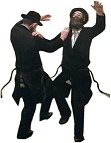
 |
Parashat Ki Tavo - כי־תבוא

[ The following entry is related to this week's Torah reading, parashat Ki Tavo. Please read the Torah portion to "find your place" here. ]
08.31.09 (Elul 11, 5769) The Torah reading for this coming Shabbat includes these words: "Because you did not serve the LORD your God with joyfulness and gladness of heart, because of the abundance of all things, therefore [all these curses will come upon you]..." (Deut. 28:47-48). Joy is a prerequisite for serving the LORD, and true happiness is found in the grace He supplies us to do His will. Indeed, the Greek word for joy used in the New Testament (χαρα) is related to the word for grace (χαρις), so there is a profound connection between apprehending grace and experiencing joy (Phil. 4:4).
Sometimes, of course, it is difficult to express joy, especially when we feel oppressed or saddened. The Scriptures never disavow our emotional states (read Psalm 13 or Psalm 88, for example), but an underlying note of grace is always sounded, even in painful moments and times. This is our consolation in suffering.... sorrowful yet ever rejoicing.

And this works the other way, too. Even in our most joyous occasions, such as the great simchah of a wedding, the "glass is shattered" to remind ourselves that our eternal joy is not yet fulfilled... We live in an "already-not-yet" state of existence. Our best moments are beset with shadows; our darkest are limned with hope of the new eternal day to come. As Paul said, "I consider that the sufferings of this present time are not worth comparing with the glory that is to be revealed to us" (Rom. 8:18).
May that day dawn for us soon, chaverim...
Turning, Turning, Turning...
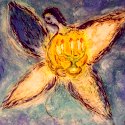
08.31.09 (Elul 11, 5769) How do we prepare for Rosh Hashanah? Traditionally we prepare through three types of turning: 1) turning to God (tefillah); 2) turning to others we've harmed or offended (teshuvah), and 3) turning to those in need (tzedakah). In all three cases we can genuinely return to God only by choosing to embrace the truth about our lives.
Our prayers (tefillot) are offered in the plural, emphasizing that we are all interconnected. This is the idea of kol Yisrael arevim zeh bazeh: "All Israel is responsible for one another" (Talmud Shavuot 39a). We are all one "body" and should one member hurt, we all are diminished (1 Cor. 12:26). Avinu Malkenu - "Our Father, our King..." "Our Father in heaven, holy is Your Name," as Yeshua taught us. Our teshuvah means that we honestly examine ourselves and repair any breach we might have created in our relationships (James 5:16). And our tzedakah means that we turn away from ourselves entirely, considering the the needs of others and their welfare instead of our own.
May it please the LORD to help us all turn to Him for life!
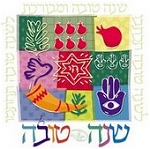
 |
A Parable for Elul

[ The following is a parable for the Season of Teshuvah, chaverim... It's my hope that this will encourage you to "return to the LORD and listen to His Voice" (Deut. 30:2). ]
08.30.09 (Elul 10, 5769) There once was a King who possessed three bottles of precious wine. Each bottle was a rare vintage blend that was bequeathed to him from his royal grandfather. The bottles, passed down from generation to generation, were carefully guarded and considered among the King's most treasured possessions.
One day the King set out to travel to distant country. He called his three most dependable servants and entrusted them with the ancient bottles, one to each. The King warned the servants not to open the bottles and then left for his journey.
The three servants were very curious about the King's command. The wine must be very fine and praiseworthy -- perhaps even a magic potion of some kind! Each of the servants secretly found themselves wanting to open the bottles to taste this special wine...
After awhile, the first servant couldn't withstand the temptation. He opened the bottle, tasted the wine, and was so overcome with desire that he drank the entire bottle. The second servant likewise wanted to open the bottle but because of his loyalty to the King, held himself back and busied himself with other affairs. The third servant, like the first, opened the bottle, tasted the wine, and was nearly driven to madness with desire to drink, but he restrained himself and overcame the temptation because of his love for the King.
When the King finally returned from his business, he called for his three servants to account for his wine. When he learned all the truth, he sentenced the first servant to death by hanging. To the second servant -- who didn't touch the wine at all -- the King gave a gift of 1,000 gold pieces. But to the third servant -- who tasted the wine but then stopped -- the King gave 10,000 gold pieces.
When the second servant heard what the third servant received, he was astonished. He went before the King and said, "My master, your royal highness, I didn't drink anything from the bottle you entrusted to me and you gave me 1,000 gold pieces. But why did you give to the one who drank some so much more than me? After all, he did not listen to you and even defied your commandment! It would have been gracious enough for you not to have punished him like the first servant, but why did you give him ten times the reward of mine?"
The King answered: "The reason is that you didn't taste the wine. It is likely that if you had done so, you would have drunk the whole bottle -- you would not have been able to subdue your desire because of the extraordinary qualities of this wine. But the servant who tasted the wine and yet withstood its allure proved his great love for me. His reward, therefore, is much greater."
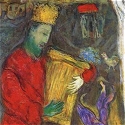
The moral of this story is not to excuse any disobedience to the King, but to encourage those of us who have "tasted of the pleasures of sin" and yet have chosen to turn away for the sake of the love of God (Heb. 11:25). The second servant -- though he was technically righteous -- had been accustomed to do the right thing based on training and habit. He was the "religious" soul who never had tasted the flavor and allure of sinful pursuits. But the third servant represents the ba'al teshuvah (i.e. the penitent soul). He has tasted of the pleasures of sin and even become accustomed to them, yet despite all of this he choose to turn away from its allure because of his great love for God. His challenges are often far more difficult than those faced by the righteous servant, and his struggles are sometimes chronic and painful. Nonetheless, he presses on in his devotion, cleaving to the LORD despite the habits and demons of his past.
We are all called to return to the LORD, regardless of our personal histories, and there is special grace and compassion given to those who turn to Him despite the failures and difficulties of the past. Nonetheless, the sages forbid us to offer prayers that ask God to alter what has already occurred. Instead, we are called to return to the Source of healing and life. The first step is da lifnei mi attah omed: "Know before whom you stand" and to wake up to reality. Undergoing teshuvah is meant to lead us to back to the Father's love in grateful service. May it please the LORD to help us return to Him this hour....
 |
New Hebrew Word Pictures Transliterated Bible
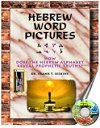
08.28.09 (Elul 8, 5769) I am now offering the entire Old Testament in both classical Hebrew and Hebrew Word Pictures - both fully transliterated and translated into English! What are "Word Pictures"? According to most scholars, the earliest form of Hebrew was not the square script we see in Torah scrolls today (i.e., ketav Ashurit) but was rather an older script, sometimes called ketav Ivri. This, in turn, was thought to derive from an even earlier pictographic script that was similar to other forms of Canaanite cuneiform. The study of the pictographic script can sometimes yield insight into the underlying meaning (etymology) of Biblical Hebrew words. For more information, please see this page.
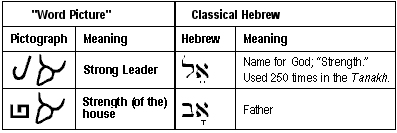 |
Important Note: While it's interesting to study Hebrew archaeology, word origins and etymology, I feel compelled to warn you to be sure to balance this approach with other methods of Hebrew Bible study. After all, while it is true that ancient Hebrew was once written in a "pre-Babylonian captivity script" that mirrors ancient Phoenician (called ketav Ivri), the further step that this script derives from an earlier form of Canaanite cuneiform is not as clearly established. Moreover, when Yeshua came to earth, He recognized the authority and sanctity of the Hebrew text of His day (i.e., the Hebrew square script -- ketav Ashurit -- as adopted by Ezra the Scribe (Matt. 5:18), and therefore we can rest assured that this text received His sanction. The Hebrew taught at this web site is essentially the same as that which Yeshua studied and endorsed...
The Need for Silence
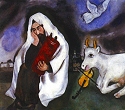
[ The following are some thoughts for this Season of Teshuvah, chaverim... It's my hope that these words might encourage you to undergo self-examination before the LORD. ]
08.28.09 (Elul 8, 5769) According to midrash, when the Torah was given at Sinai there was a complete and total silence, a holy hush... Six hundred thousand men stood at the foot of the mountain -- and no one talked and nothing moved. All the animals likewise were frozen in silence, and not even the sound of a bird winged across the desert sky. There was utter stillness and calm. And it was in this state of quietude that each person heard the kol demamah dakkah, the "still small voice" (קוֹל דְּמָמָה דַקָּה), and inwardly apprehended: Anochi Adonai Eloheykha ("I am the LORD your God...").
In a similar manner, each of us needs to quietly listen to the inner voice of our hearts to help us do teshuvah. We need to clear away the competing "voices" for our attention in order to shema, hear. The voice of conscience can remind us that we've done something we shouldn't have done, or that we haven't done something that we should have... To detect such messages, however, silence is absolutely necessary -- i.e., we must find "room" for the inner voice to be sounded. If we refuse to heed the inner voice, or if we suppress its messages, we will eventually be filled with inward "static" and thereby unable to clearly receive truth from God. As Yeshua warned, "Pay attention to what you hear: with the measure you use, it will be measured to you, and still more will be added to you. For to the one who has, more will be given, and from the one who has not, even what he has will be taken away" (Mark 4:24-25).
Most of us are fearful of this process of "inward listening" because we do not want to feel ashamed. No one likes feeling naked, vulnerable, and guilty, after all. But instead of viewing shame as something that keeps us from God or that condemns us, we can accept it as a call to return to Him for healing and help. In this way shame itself can be a messenger of our need for God's love and forgiving touch...
We must therefore first (silently) acknowledge and receive the truth about ourselves. But note that this is not some esoteric venture or monastic practice, since the aim of such introspection is real connectedness and healing in our relationships with others. Only after we acknowledge our sins can we (vocally) confess the truth about ourselves to those whom we have offended or harmed. Someone once said that a friend is someone who knows all about you -- but who loves you anyway.
Even though we are "new creations" in the Messiah we must walk in the light of truth -- and that means acknowledging our ongoing need for God's intervention in our lives. "If we are confessing our sins, God is faithful and just to forgive us our sins and cleanse us from all unrighteousness" (1 John 1:9). This is the path of healing and grace for those who are returning to God. We do not believe in some of sort of "perfectibility" here on earth, in olam ha-zeh. Even the apostle Paul wrote: "I, for my part, do not think of myself as having yet gotten hold of the goal; but one thing I do: forgetting what is behind me and straining forward toward what lies ahead. I press on toward the goal for the prize of the upward call of God in the Messiah Yeshua" (Phil. 3:13-14).
Yeshua said, "there is nothing hidden which shall not be manifested; nor is there any thing kept secret that shall not be revealed." We are only as sick as the secrets we keep. May it please the LORD to help us be honest with ourselves and with others. May He give each of us grace to draw near to Him in repentance during this Season of Teshuvah. Time is short, chaverim. A day of reckoning draws near. May we all be sober-minded and draw close to the LORD while we can...
Personal Update: I am still sick and have developed a painful sore throat. I haven't been able to sleep all night... Please pray that I do not need to go to the doctor or that it's not a strep infection. I also broke a tooth while chewing gum tonight, so this is a time of some testing for me, friends. Thank you for your prayers.
 |
Cheshbon Hanefesh - חֶשְׁבּוֹן הַנֶּפֶשׁ
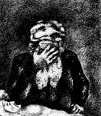
[ The following are some thoughts for this Season of Teshuvah, chaverim... It's my hope that these words might encourage you to undergo self-examination before the LORD. ]
08.26.09 (Elul 6, 5769) There is a midrash about a dialog between Adam and God after Adam's banishment from the Garden of Eden. Adam feared that all humans would later blame him for their mortality, but God replied, "Don't worry about the others. From now on, each soul will be responsible for giving account of his or her life. Each person is required to write his or her own 'Book of Life.' On the Day of Judgment, I simply ratify what has been written."
We are all on a spiritual journey, writing the "Book of our Life." To help us in the "writing" process, the Jewish sages decided that the month of Elul should be set aside as a season for cheshbon hanefesh - "making an account of the soul." This means that we engage in honest self-examination about our behavior. We take time to review our lives from the previous year. "How did I get to this place in my life?" "Where am I now?" "Am I where I should be?" We engage in this process of self-examination with an aim to grow -- to let go of the pain of the past and move forward.
We must begin by asking God for courage and strength... We must let go of the fear that we will discover the truth about who we really are -- about what we've done, what we've thought, about who we've allowed ourselves to become. Confession (ὁμολογία) means bringing yourself naked before the Divine Light to agree with the truth about who you are.... We need to do this if we are to be free from the pain of the past. When King David wrote, "The LORD is my Light and my salvation; whom shall I fear? (Psalm 27:1), he implied that he should even be free of fear of himself and of his past....
As has been noted by various sages, different sins require different types of confession. Sins against God (bein Adam la-Makom) require confession to God alone for the sake of obtaining divine forgiveness. Sins against others (bein Adam l'chavero) require that we personally acknowledge our harm to them and ask them for mechilah (מְחִילָה), forgiveness. Finally, sins against ourselves require that we admit that we have damaged our own lives and be willing to accept personal forgiveness. "For those whom we have wronged (including ourselves), may we be forgiven..."
It is important in this process not to blame others for our sins, since the object here is to work on changing ourselves, not others. As the Baal Shem Tov once said, "Sinners are like mirrors. When we see faults in others, we must understand that they only reflect the evil within ourselves." Of course this is not to say that you might not have been truly hurt by the actions and sins of others, but that is a matter of your own mechilah (forgiveness) to be given them if they come to you in teshuvah, not a matter of cheshbon hanefesh. The focus in this process is on our own sins -- and how we must respond to our own sinful condition. We cannot truly make amends with another if we are expecting a reciprocal act from them (e.g., "I've apologized to you, now it's your turn!")
Regarding self-forgiveness, it might be helpful to think about a sinful act you've repeatedly struggled with over the last year. Now imagine you are talking to a dear friend whom you deeply respect who is struggling this same way. How would you counsel him or her? Your answer can be part of the process of your own self-examination, where you can look within yourself honestly yet without the intent of bringing shame or further pain to your life. After all, the goal here is teshuvah -- return to God -- but you are not likely to do this if you are in a state of self-loathing or "toxic shame."
Most Christians are familiar with the idea of self-examination before partaking of the elements of the Lord's Table (i.e., the commemoration of Yeshua's last Passover Seder that prefigured His sacrifice as the Lamb of God who takes away the sins of the world). "Let a person examine himself first (δοκιμάζω - test for authenticity), and then he may eat of the bread and drink from the cup" (1 Cor. 11:28). Now while it is assuredly true that we should examine ourselves before this ritual act, self-examination and confession should be part of our everyday lives as followers of the Messiah. The unexamined life -- especially as a Christian -- is not worth living, and the practice of suppressing the truth about our sinful condition can lead to self-deception and even death (1 Cor. 11:30). "If we say we have no sin, we deceive ourselves, and the truth is not in us; if we confess our sins, he is faithful and just to forgive us our sins and to cleanse us from all unrighteousness" (1 John 1:7-8). "Therefore, confess (ἐξομολογέω, lit. 'confess out') your sins to one another and pray for one another, that you may be healed" (James 5:16).
Ultimately, confession of the truth is not optional for anyone. For the follower of the Messiah, such confession produces salvation: "for with the mouth one confesses and is saved" (Rom. 10:10). But for those who refuse to undergo self-examination and confess the truth, there is the Lord's own reciprocal confession: "Then I will confess to them (ὁμολογήσω αὐτοῖς), 'I never knew you; depart from me, you workers of lawlessness' (Matt. 7:23).
There is a godly sorrow that works teshuvah within our hearts. This is a sorrow or a mourning (λύπη) -- not an exercise in self-contempt or false pride -- for the pain we have caused the LORD with our actions... "For godly grief produces a repentance that leads to salvation without regret, whereas worldly grief produces death" (2 Cor. 7:10). This kind of sorrow is ultimately healing, since it impels us to return to the source of Love and healing we so desperately need. May God all bless us with such sorrow, the "gift of tears."
 |
New Hebrew Meditation

08.24.09 (Elul 4, 5769) In anticipation of the coming High Holidays (Rosh Hashanah begins Friday, Sept. 18th at sundown), I wrote a new Hebrew meditation ("Turning Back to God") that centers on the idea of teshuvah, or repentance. I hope you will find it helpful, chaverim.
Parashat Ki Teitzei - כי־תצא

08.23.09 (Elul 3, 5769) The Torah reading for this week is Ki Teitzei ("When you go out"), the 49th portion of the Hebrew year. If it pleases God I will add some additional commentary to this portion later, chaverim, as well as some more insights about the special month of Elul. My family's been sick for the last few days and my energy supply is quite low. Thank you for your patience...
Another Prayer Request...
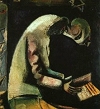
08.21.09 (Elul 1, 5769) I've been afflicted the last few days with eye trouble, so much so that it's nearly impossible to read and write. I also picked up the flu and am dealing with fever, body aches, etc. This is a hard start to the month of Elul, chaverim.... Please offer up a prayer for my healing. Thank you so much. - john
Rosh Chodesh Elul

08.20.09 (Av 30, 5769) Last evening at sundown began Rosh Chodesh Elul ("Head of the Month of Elul"). As I've mentioned elsewhere, this signals the beginning of a 40-day countdown that culminates with the High Holiday of Yom Kippur. Here's a drawing I made to help you visualize this season of the Jewish calendar:
Note that since Av is a 30 day month, Rosh Chodesh Elul actually runs for two days -- both on the 30th of Av and again on Elul 1. Beginning on the second day of Rosh Chodesh Elul (and continuing until Rosh HaShanah) the custom is to blow the shofar every day (except on Shabbat). Psalm 27 is often recited every day during this time as well.
There are four primary types of shofar blasts:
- Tekiah (תְּקִיעָה) - A long single blast (the sound of the King's coronation)
- Shevarim (שְׁבָרִים) - Three short wail-like blasts (signifying repentance)
- Teru'ah (תְּרוּעָה) - Nine staccato blasts of alarm (to awaken the soul)
- Tekiah ha-Gadol (תְּקִיעָה הַגָּדוֹל) - A great long blast (for as long as you can blow!)
The general custom is to first blow tekiah, followed by shevarim, followed by teruah, and to close with tekiah hagadol.
Note: Click here for the free Shofar Blessing Study Card.
Salvation Blessing Study Card! 

08.17.09 (Av 27, 5769) Today I designed another blessing "Study Card" to help you recite a Hebrew blessing thanking God for the gift of salvation. I hope you find this helpful, friends. As I mentioned yesterday, I am considering creating several of these cards for those of you who want a convenient tool for your sacred occasions.
Kids Sick with the flu...

08.18.09 (Av 28, 5769) We're all sick with the flu over at our house... Four-year-old Josiah is running a fever and has a cough. He has entirely lost his voice and is physically wiped out. Baby Judah is also feeling sick, too. Please join our prayers for "refuah shelemah" (רפוּאה שׁלמה, a complete healing) for these boys... Thank you, chaverim.

Josiah's Latest Art
Shofar Blessing Study Card! 
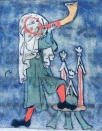
08.17.09 (Av 27, 5769) Today I designed a Shofar blessing "Study Card" to help you learn to recite the Hebrew blessing before sounding the shofar. Here's how you can create the 3x5" study card:
- Download the page (click here).
- Print to heavy paper (e.g., 80 pound white cover stock paper is ideal).
- Use scissors to cut out the front/back of the card along the indicated lines.
- Tape the front and back of the card together, back to back.
- Laminate the card at Kinkos, Office Depot, etc.

I hope you'll find this helpful, friends. I am considering creating several other "Study Cards" like this for those of you who are learning to read Hebrew. That way you can create a collection of Hebrew "blessing cards" you could use for various occasions. Please let me know if you think this approach will be helpful, chaverim...
Shofars and Swine Flu

08.17.09 (Av 27, 5769) Today I read a fascinating article about how dozens of rabbis "armed with shofars" boarded airplanes to fly over the skies of Israel "to battle" the H1N1 swine flu virus. The article relates, "About 50 Jewish holy men chanted prayers and blew shofars (ritual rams' horns) in an aircraft circling over the country in the hope of stopping the spread of the virus." Now this might strike you as absurd until you recall that the shofar is used as an instrument of spiritual warfare... For example, the Torah states, "When you go to war in your land against an adversary who is oppressing you, you are to sound an alarm with trumpets; then you will be remembered before the LORD your God and you will be saved from your enemies" (Num. 10:9).
The shofar first brings to mind the ram caught in the thicket by its horns which Abraham sacrificed in place of his son Isaac at Mount Moriah (Gen. 22:13). By extension, this "Ram of God" -- prepared from the "foundation of the world" -- is a picture of substitionary sacrifice of the God's Son for the sins of the world. Indeed, the first occurrence of the word love in the Torah (אהבה, ahavah, in Gen. 22:2) refers to a father's love for his "only" son who was offered as a sacrifice, a clear foreshadowing of the greater "Akedah message" of the Gospel (John 3:16). Note in this connection that the sacrificial redemption involved violent spiritual warfare between God and the Satan (Gen. 3:15). For the believer in Yeshua, the blast of the shofar represents the shout of God's victory over the power of sin and death.

In the Scriptures, the word shofar (שׁוֹפָר) first occurs in Exodus 19:16 when the Torah was given to Israel during Shavuot (Pentecost): "On the morning of the third day there were thunders and lightnings and a thick cloud on the mountain and a very loud shofar blast (קל שׁפָר חָזָק מְאד), so that all the people in the camp trembled." This is sometimes called the "first trump" of God.

The shofar is also mentioned in connection with both Rosh Hashanah (Lev. 23:24, Num. 29:1) and Yom Kippur: "Then, on the tenth day of the seventh month, on Yom Kippur, you are to sound a blast on the shofar; you are to sound the shofar all through your land" (Lev. 25:9). In later Jewish history, since the shofar was sounded throughout the preceding month of Elul, the blowing of the shofar on the first of Tishri (i.e., Rosh Hashanah) was sometimes called "the last trump," while the shofar blast on Yom Kippur was called the "great trump," since at that time judgment was sealed.
Apart from these purposes, the shofar was also used to sound alarms for the camp of Israel (Num. 10:5-6, Ezek. 33:3), to convene assemblies, to announce the new moon and the Jubilee Year, to herald messages, and to coronate kings. The shofar was also used when Joshua waged war against Jericho (Josh. 6:4-20) and during other military campaigns (Judges 7:22). Indeed, when Israel engaged the enemy in battle, the priests and Levites would first prepare the way by sounding the shofar (2 Chron. 3:12, Neh. 4:14, Jer. 4:19, Amos 2:2, Zeph. 1:6, etc.).
The shofar was also used during worship at the Mishkan (Tabernacle) and Temple. It was sounded when the Ark of the Covenant was returned to the camp (1 Sam. 4:5, 2 Sam. 6:15) and was regularly used as an instrument of praise in the Temple (2 Chron. 15:14, Psalm 47:6, 89:16, 150:5). Blowing the shofar declares that the LORD God is the King of the universe, as it says in Psalm 98:6, "With trumpets and the sound of the shofar (וְקוֹל שׁוֹפָר), shout for joy before the King ADONAI (הַמֶּלֶךְ יְהוָה)." The shofar also signals Israel's glorious redemption during the Day of the LORD (יוֹם־יְהוָה) at the end of the age (Isa. 27:13, Joel 2:1).
Yeshua spoke of the shofar blast from the angels who would "gather together His elect from the four winds, from one end of heaven to the other" (Matt. 24:31). Indeed, Yeshua Himself will blow a shofar on the day of rapture: "For the Lord himself will come down from heaven with a rousing cry, with a call from one of the ruling angels, and with God's shofar; those who died united with the Messiah will be the first to rise" (1 Thess. 4:16). Moreover, at the sound of the "great shofar" (shofar hagadol), the dead will be raised and death itself will be "swallowed up" in victory (1 Cor. 15:51-57).
יוֹם אִירָא אֲנִי אֵלֶיךָ אֶבְטָח / "When I am afraid, I put my trust in you" (Psalm 56:4). This world - olam ha-zeh - is soon coming to an end, chaverim... Although we are tempted to fear the days of testing and tribulation to come, we must find a deeper reason to rejoice. We can anticipate the sound of the heavenly shofar signaling the victory of the LORD over the princes of this age: "The seventh angel sounded his shofar; and there were loud voices in heaven, saying, "The kingdom of the world has become the Kingdom of our Lord and his Messiah, and he will rule forever and ever!" (Rev. 11:15).
During the start of this season of teshuvah it's important to recall that the shofar is also a means of awakening the slumbering soul... Maimonides writes: "There is a hidden message we are supposed to infer by listening to the shofar. It suggests to say: 'Sleeping ones! Awaken from your sleep! Slumbering ones! Awaken from your slumber! Examine your deeds. Remember your Creator and do teshuvah." This idea is echoed in the New Testament writings: "Awake, O sleeper, and arise from the dead, and Messiah will shine on you" (Eph. 5:13-14). This theme of "awakening from sleep" is used elsewhere in the Scriptures (e.g., John 11:11, Rom. 13:11, 1 Thess. 5:6, Dan. 12:1-2, Psalm 78:65, etc.). The sound of the shofar calls us to return to the LORD and seek His face. And since finding God is our greatest joy, King David rightly wrote: "Happy is the people who know the teruah [i.e. the shofar blast]" (Psalm 89:16).
May the LORD God of Israel bless you and keep you and shine His glory upon you for this coming new year! And may you be ready to hear the sound of the heavenly shofar that will call you into His glorious presence soon!
 |
Preparing for Elul

08.16.09 (Av 26, 5769) This Wednesday evening marks Rosh Chodesh Elul (the "new moon" of the Hebrew month of Elul), which, according to Jewish tradition, was the time when Moses reascended Mount Sinai (the third time) to receive the second set of Tablets from the LORD. Since the tablets were not inscribed until 40 days later (on the 10th of Tishri, the date of Yom Kippur), the 29 days of Elul are considered a time of selichot (prayers for forgiveness) in anticipation of the Ten High Holy Days (Tishri 1-10). For more, see this page.
Beginning on the second day of Rosh Chodesh Elul (and continuing until Erev Rosh HaShanah) the custom is to blow the shofar every day (except on Shabbat). Psalm 27 is often recited every day during this time as well...
Parashat Shoftim - שופטים

08.16.09 (Av 26, 5769) The Torah reading for this week is Shoftim ("Judges"), the 48th portion of the Hebrew year. In this parashah we find the only passage in the entire Torah where Moses explicitly identifies himself as a prophet of the LORD. Moreover, this is also the only passage where Moses identifies the coming Messiah as "a Prophet like me" (Deut 18:15; cp. John 6:14). Read the Torah summary to see how the Lord Yeshua resembled Moses in no less than thirty (30) ways!
This Wednesday (August 19th) at sundown is also Rosh Chodesh Elul ("Head of the Month of Elul"). Rosh Chodesh Elul actually runs for two days since when a Jewish month has 30 days, both the last day of the month and the first day of the coming month function as the "new moon." For more information about the season of Elul -- and the forty days leading up to the High Holidays, see various entries below...

The name "Elul" (אֱלוּל) has been interpreted by the sages as an acronym for the Hebrew phrase Ani L'Dodi V'Dodi Li (אֲנִי לְדוֹדִי וְדוֹדִי לִי) ("I am my beloved's and my beloved is mine," Song 6:3). The sages teach that this is meant to remind us to "return to our first love," especially during the 40-day period beginning with the new moon of Elul and ending with the Jewish High Holidays in the fall.
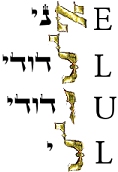
Tzedek, Tzedek Tirdof...
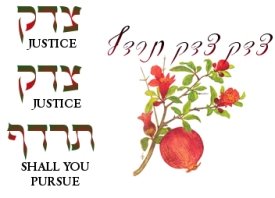
[ The following entry is related to this week's Torah reading, parashat Shoftim. Please read the Torah portion to "find your place" here. ]
08.16.09 (Av 26, 5769) This week's parashah (Shoftim) includes the famous phrase "tzedek, tzedek tirdof" (צֶדֶק צֶדֶק תִּרְדּף): "Justice, Justice you shall purse" (Deut. 16:20). The word tzedek means "righteousness" and involves the duty to adhere to moral truth. The act of charity (called tzedakah) is therefore regarded an obligation rather than as gemilut chasadim (i.e., an act of benevolence). The prophet Isaiah wrote (Isa. 32:17): "The work of righteousness (tzedakah) shall be peace" (וְהָיָה מַעֲשֵׂה הַצְּדָקָה שָׁלוֹם), and added that "the service of righteousness shall be quietness and security forever (וַעֲבדַת הַצְּדָקָה הַשְׁקֵט וָבֶטַח עַד־עוֹלָם).
It is psychologically impossible for us not to judge, since the mind must make distinctions in order to function intelligibly. The Talmud states that when we judge mercifully and in accord with the truth, the Divine Presence joins us, but if we act corruptly, we "push" the Presence away and create a sense of exile. Yeshua told us to "whatever you wish that others would do to you, do also to them, for this is the Law and the Prophets" (Matt. 7:12). As we judge others, so we are judged ourselves. Looking at others from a selfish perspective is therefore a form of "bribery" that blinds us to the truth about righteousness (see Deut. 16:19).
Tzedek, tzedek tirdof also means that justice must be pursued in a just manner. The methods used to obtain justice must themselves be just. The Scriptures therefore do not advocate pragmatism or utilitarian thinking. There are no "noble lies" in the Kingdom of Heaven. Violence (verbal or physical) or deception done in the name of God is always a bad idea. We must execute great restraint and caution when we confront oppression in the world. If you want to change the world around you, begin with yourself....
Our Torah reading adds, "You must be wholehearted with the LORD your God" (תָּמִים תִּהְיֶה עִם יְהוָה אֱלהֶיךָ) (Deut. 18:13). Notice the little word "with" in this verse (עִם). This verse hearkens to Micah 6:8: "What does the LORD require of you but to do justice (mishpat), and to love kindness (chesed), and to walk humbly (hatznea lechet) with your God?" Having a humble heart walks with the LORD. The word translated "humbly" comes from the same root that gives us the word tzeniut (צְנִיעוּת), meaning modesty or humility. Humility begins with the awareness that 1) there is a God and 2) you are not Him.... It is the practice of "knowing before whom you stand" and living your life in light of this basic truth.
A.W. Tozer wrote: "The humble man will attain a place of soul rest. As he walks on in humility he will be happy to let God defend him. The old struggle to defend himself is over. He has found the peace which humilty brings." May it please the LORD to give us all hearts of genuine humility.
 |
Unit One Hebrew Homeschool

08.16.09 (Av 26, 5769) Several people have asked me to finish the Hebrew homeschool resources for Unit One because they're planning "Tot Shabbat" classes for the fall, so I've been working hard to get more content ready for classroom use. After Unit One, I plan to add material for Unit Two (the vowels) and Unit Three (syllabification, Hebrew keywords). I hope you will find these materials helpful -- whether you're teaching classes or if you are an adult learner of Hebrew!
I also hope to create some easy-to-read "Hebrew Blessings Cards" that you can laminate and use for various events during the year. For instance, Rosh Hashanah is coming up next month, and to help you recite the appropriate blessing, I want to create a 5x7 card that you can print and recite before sounding the shofar. I think this is especially important because the followers of Yeshua -- of all people -- should understand the significance of the "Ram of God" and of the Ram's Horn (i.e., shofar) that signifies God's gracious provision at Moriah. I'll keep you posted on this, chaverim.
 |
Hebrew Homeschooling Resources

08.14.09 (Av 24, 5769) I've been very busy the last few days trying to catch up with various questions posted over at the Q&A forum as well as replying to hundreds of backlogged e-mails... Meanwhile, I'm continuing to develop additional homeschool resources for Unit One of the online Hebrew Grammar, though creating these materials is very time consuming due to the special formatting issues of the pages.
I'm hoping to add some additional comments about this week's Torah portion and the coming month of Elul later today, if it pleases God. Thank you all for standing with Hebrew4Christians and encouraging this work: This site simply cannot exist without your love and support! Shalom chaverim.
Middle Chapter of the Hebrew Bible?
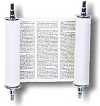
08.13.09 (Av 23, 5769) Today someone asked me whether it was true that the "middle chapter" of the Hebrew Bible was Isaiah Chapter 53. Apparently this person had recently heard (in a sermon) that according to "computer computations" the middlemost chapter of the Tanakh was the chapter about the Suffering Servant, and this was designed by God to show the Jewish people that Yeshua is literally the centerpiece of the Hebrew Scriptures...
I don't enjoy debunking such ideas, but this idea is simply nonsense - and it's downright misleading to preach this sort of thing from the puplit.... First of all it needs to be kept in mind that Judaism doesn't really have "one book" they call "the Bible," but rather several different scrolls: the Sefer Torah, the Haftarah (prophets), the Ketuvim (Psalms, Proverbs, Job), the five megillot (Ruth, Lamentations, Ecclesiastes, Esther, Song of Songs), and so on. Moreover, "versification" (i.e., assigning verse numbers to the running text) and "chapter" divisions are a relatively modern invention, and there are verse (and chapter) differences between the Masoretic text, for example, and the text that underlies the Greek Septuagint (i.e., the LXX, or the Greek translation of the Old Testament created in 2nd-3rd centuries BC).
As a piece of trivia, according to the Talmud (Kiddushin 30a) the middle verse of the Torah is Leviticus 13:33, while according to Masoretic text, it is Leviticus 8:7. According to the Jewish sages, this is a "machlochet" (debate) that must "wait until Elijah the Prophet comes" to settle the matter. At any rate, in the (Protestant) Christian Old Testament, the middle chapter appears to be Job 29 (whereas the middle verse would be 2 Chron. 20:17-18).
While it's vital to share our faith with others, it's vital to be honest in our approach... Suggesting that Isaiah 53 is the central chapter of the Hebrew Bible is actually counterproductive when sharing the Gospel message with your Jewish friends. It's better to take the time to genuinely understand the contents of the Torah (and Tanakh) so that you can clearly show how Yeshua is the fulfillment of the promises of the LORD God of Israel.
 |
Personal Prayer Request
08.12.09 (Av 22, 5769) Shalom chaverim... It's written in the Scriptures: "Openly acknowledge (ἐξομολογέω, lit. 'confess out') your sins to one another, and pray for each other, so that you may be healed" (James 5:16). Things have been stressful for us lately, and it's been taking its toll. Please offer up a prayer on behalf of my family for shalom ha-bayit (peace in the family) - and especially for Olga and my two children. Thank you.
Blessings and Brokenness

[ The following entry is related to this week's Torah reading, parashat Re'eh. Please read the Torah portion to "find your place" here. ]
08.10.09 (Av 20, 5769) "And now Israel, what does the LORD your God ask from you but only to fear (לְיִרְאָה) the LORD your God, to walk (לָלֶכֶת) in all His ways, to love (לְאַהֲבָה) Him, and to serve (לַעֲבד) the LORD your God with all your heart and all your soul?" (Deut. 10:12).
As I mentioned yesterday (see below), traditional Judaism believes in personal responsibility as expressed through the exercise of the human will. This is summarized in the well-known maxim of the Talmud: "All is in the hands of God except the fear of heaven" (Berachot 33b; Niddah 16b). In his commentary on the verse quoted above, Rashi noted that when God asked Israel "only to fear" Him, this implied that He voluntarily withdrew His sovereign control over human beings so that no one would be overwhelmed or forced into serving Him. God gives to each soul the path of goodness (that leads to blessing) and the path of wickedness (that leads to curse). Paradoxically, we are "forced" to freely choose whether to live as a tzaddik (righteous person of faith) or as a rasha (idolatrous person of unbelief) -- and we cannot not choose! Ultimately, the choice whether or not to turn to God is the only real one we have, since it determines everything else we see and do...
It is interesting to note that the sages of the Tosafot (i.e., the commentary found on the outer margin and opposite Rashi's notes in the Talmud) quote a different statement regarding this verse: "All is in the hands of Heaven except for thorns (tzinim) and snares (pachim)." This apparently comes from the Book of Proverbs: "Thorns (צִנִּים) and snares (פַּחִים) are in the path of the perverse; (but) he who guards his soul will distance himself from them" (Proverbs 22:5).
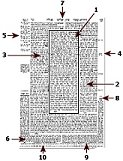
R' Yaakov said, "This world is like a corridor before the World to Come; prepare yourself in the corridor, that you may enter into the hall" (Pirke Avot 4:21). God sets "thorns and snares" within the "corridor" here to test us in our way. If we are perverse, we will find ourselves injured and stuck through various circumstances of our own making. The one who "guards his soul," however, will steer clear of these things and therefore be spared much tzuris and heartache. This is consonant with the teaching of the New Testament: "Do not be deceived: God is not mocked, for whatever one sows, that will he also reap" (Gal. 6:7). Our moral choices do indeed matter and affect our experience of life. Some things, such as our DNA, our intelligence, the conditions that surround us in history, and so on, are indeed beyond our control, but we all nontheless face "thorns and snares" to circumnavigate if we are to turn away from perversity and guard our souls, as the Proverb instructs.
The ultimate aim of the various "thorns and snares" of life, then, is to "wake us from our slumbers" to reveal the way of life... As C.S. Lewis once said, "God whispers to us in our pleasures, speaks to us in our conscience, but shouts in our pains: It is His megaphone to rouse a deaf world."
 |
Keep pressing on, chaverim! God in His infinite wisdom uses troubles and brokenness in our lives so that we can make the only choice that really matters: to turn to Him for healing.
Note: For more about this subject, please see "Paradox and Presence."
Parashat Re'eh - ראה

[ The following entry concerns this week's Torah reading, parashat Re'eh. Please read the Torah portion to "find your place" here. ]
08.09.09 (Av 19, 5769) This week's parashah (Re'eh) begins with the portentous words: "See (רְאֵה), I give before you today a blessing and a curse" (Deut. 11:26). The sages note that singular form of the verb (i.e., "you see!") is used here to stress that although Torah is freely given to all "who have ears to hear," it's our own personal responsibility to "choose life" and walk its message out in our lives (Deut. 30:19). This has traditionally been understood to mean that God gives each of us the path of goodness (that leads to blessing) and the path of wickedness (that leads to curse). The path we are are choosing, in other words, is ultimately our own choice...
An undisputed maxim of the Talmud is: "All is in the hands of God except the fear of heaven (yirat shamayim)" (Berachot 33b; Niddah 16b). In other words, though God constantly showers the world with grace and light, He does not "force" us to revere His Presence but rather leaves that choice with us. God could overwhlem us all so that we had no choice but to see and fear Him, but He "withdraws" Himself and restrains His influence in our lives so that we can exercise faith. The Hebrew word for seeing (ראה) and the word for fearing (ירא) share the same root. We cannot genuinely "choose life" apart from personally seeing it, but we cannot see it apart from the reverence of God. The reverence of God sanctifies our perception and enables us to see clearly. Therefore the righteous "walk by faith, not by sight" (2 Cor. 5:7).
Since our lives are part of a greater whole, we must understand that every deed we do brings to the world around us either a blessing or a curse.... But before we rush out to "bless" the world, however, we must first take pains to undergo self-examination (Matt. 7:5, 2 Cor. 13:5, Gal. 6:3-4). From a place of humilty and an awareness of our own frailty are we able to genuinely help others. As Rabbi Israel Salanter once said, "When I was young, I wanted to change the world. I tried, but the world didn't change. So I decided to change my town, but my town didn't change. Then I resolved to change my family, but my family didn't change. Then I realized that I first had to change myself." (I would add, "but then I realized that I couldn't change even myself, so I cried to the LORD for a new heart and He answered my plea...")
The LORD "brings us into the land" in order to serve Him and others in grace and love. The commandment to practice tzedakah (charity) and shemitat kesafim (the forgiving of debts) are intended to promote a dignified society of people that care for one another as mishpachah (family). Thus are we called to be am segulah - a treasured people - forming a community of chesed (love) and beauty for the glory of our Messiah (1 Pet. 2:9).

Judah (click for larger)
 |
Preparing for Elul...
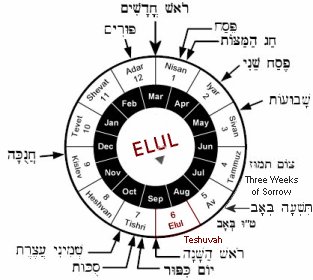
08.07.09 (Av 17, 5769) Counting from the start of the Biblical calendar (i.e., Nisan 1), the new moon of Elul (אֱלוּל) is the sixth moon of the year. However, since traditional Judaism regards the seventh month (i.e., Tishri, תִּשׁרִי) as the start of the Jewish civil year, the moon of Elul signals a time of preparation for the coming High Holidays, called the "Days of Awe" (ימים נוראים). In other words, if you count from Tishri as the first month of the calendar (as the Rabbinic tradition does), the month of Elul would be the last of the year -- a time to make "New Years Resolutions" and to turn away from sin before the start of the New Year.
The name "Elul" (אֱלוּל) has been interpreted by the sages as an acronym for the Hebrew phrase Ani L'Dodi V'Dodi Li (אֲנִי לְדוֹדִי וְדוֹדִי לִי) ("I am my beloved's and my beloved is mine," Song 6:3). The sages teach that this is meant to remind us to "return to our first love," especially during the 40-day period beginning with Rosh Chodesh Elul and ending with the High Holidays. This year the month of Elul begins on August 20th at sundown.

Although it is a somber time of soul-searching (i.e., cheshbon ha-nefesh, חֶשְׁבּוֹן הַנֶּפֶשׁ) with appeals for forgiveness (selichot), the month of Elul reminds us of the high calling we have to examine and prepare ourselves as the spotless and blameless Bride of the Messiah (2 Peter 3:14).
Heart Circumcision

[ The following entry concerns this week's Torah reading, parashat Eikev. Please read the Torah portion to "find your place" here. ]
08.06.09 (Av 16, 5769) This week's Torah includes the second (of three) portions of the Shema (called the Vehayah). These words, reiterating the connection between Israel's devotion to the LORD and their blessing as God's chosen people, are recited twice a day by Orthodox Jews all over the world.
The fear of the LORD, yirat Adonai (יִרְאַת יהוה), means practicing the Presence of the LORD at all times in our lives. It is the conscious realization that the LORD sees us and is profoundly concerned with our lives. "There is an eye that sees and an ear that hears, and all our deeds are written in a book" (Avot 2:1, cp. Rev. 20:12). The LORD is the Creator of heaven and earth and He has set His jealous love upon those who fear Him. Therefore we are called to "circumcise our hearts" -- i.e., remove the "thickening" or hardening -- and be no longer stubborn (or "hard-hearted").
The Apostle Paul taught that the ritual act of circumcision was meant to be the outward sign of what is invisible, namely, a thorough commitment to God (Rom. 2:28-29). Paul makes the point that you can physically circumcised and not have a circumcised heart, and you can be circumcised in the heart and not physically. After all, which is more important to God, the outward show or inward reality? Loving God in the truth is the circumcision of the heart.
Shabbat Shalom, chaverim....

Judah, 17 weeks
Personal Update: We've been faced with some unexpected expenses recently. Our refrigerator broke, our driveway had to be repaired, and I needed to purchase new anti-virus software due to increased spam viruses regularly sent to this ministry (I also need to purchase a backup system over here in case of a catastophic failure of this computer). Sales have been very low over here, however, chaverim. Perhaps more alarmingly than all this is that I've been feeling somewhat spiritually "dry" and even downcast for the last few weeks. I am sensing that the L-rd wants me to focus on some new things, but I've yet to receive clear revelation from Him. We're praying about starting a home fellowship here in Minnesota (we stopped attending Bethlehem Baptist due to John Piper's commitment to Covenant Theology), but time and resources are quite limited, so at this point we're unsure which way to go. There's also a possibility that I be able to teach Greek and Hebrew (part time) at a new college program being developed, though the details are unclear at this point. Please: your prayers for this ministry are most appreciated, friends....
 |
A Jewish "Valentine's Day"?

08.05.09 (Av 15, 5769) Hebrew letters can be used to express numbers. Joining the letters Tet (9) and Vav (6), for example, equals the number 15, usually written as the acronym "Tu" (ט"ו). The phrase "Tu B'Av" (ט"ו באב) indicates the 15th day of the month of Av (אָב), a "full-moon" holiday that has been celebrated as a day of love and affection since Biblical times. In modern Israel it is customary to send a bouquet of red roses to the one you love on Tu B'Av. Romantic songs are played on the radio and parties are held in the evening throughout the country.
The first mention of Tu B'Av is found in the Mishnah, where Shimon ben Gamliel is quoted as saying, "There were no better (i.e. happier) days for the people of Israel than the Fifteenth of Av and Yom Kippur, since on these days the daughters of Israel go out dressed in white and dance in the vineyards. What were they saying: Young man, consider whom you choose to be your wife... (Taanit, Chapter 4).

Since it is the "last" festival of the Jewish year, prophetically Tu B'Av pictures our marriage to the Lamb of God (Seh Elohim), the LORD Yeshua our beloved Mashiach. On a soon-coming day those who belong to the LORD and are faithful to follow His ways will be blessed with the unspeakable joy of consummating their relationship with Him. This is heaven itself - to be in the Presence of the LORD and to be His beloved (Rev. 19:6-9).
Parashat Eikev - Grappling with Grace

[ The following entry concerns this week's Torah reading, parashat Eikev. Please read the Torah portion to "find your place" here. ]
"And if you will indeed obey my commandments that I command you today,
to love the LORD your God, and to serve him with all your heart
and with all your soul..." (Deut. 11:13)
08.04.09 (Av 14, 5769) Some people seem to think that "religious observance" is the way of salvation... Whether it's through the practice of a set of prescribed rituals, confessing to a particular creed, or becoming a member of a particular religious in-group, such souls have trouble accepting the idea that God's mercy may be given to those who -- unlike them -- haven't "worked for it" and therefore don't deserve it... They apparently have yet to discover the shocking and tragic truth of their own radical need for healing and therefore they're scandalized by the idea of God's unconditional love and acceptance. Perhaps they subconsciously believe that love must be earned and therefore they're careful to disguise the truth about who they really are (especially from themselves). They may hide behind ideologies, theologies, ritual acts, church affiliation or attendance, labels, pretenses, excuses, etc. -- all with the aim of being hidden within the crowd -- but they dare not view themselves as individuals who stand entirely dependent upon God alone for help... No, that is too terrifying, because the various self-made props given to shore up one's identity are rendered ineffectual and void before the Holy One.... All our attempts at self-justification invariably create ongoing anxiety within the soul.
I sometimes wonder about people who are obsessed over technical questions regarding "Torah observance" (i.e., dietary law, Sabbath Observance, ritual practices, etc.) Often they seem to be sincere, upright, and zealous for God, but when they're cross-examined about the ground of their acceptance in light of the Cross of Yeshua, it's often surprising how their lip service regarding the grace of God slips into talk about God's conditional love and acceptance. The work of the Messiah somehow isn't enough (G"F) and therefore "salvation" needs to be completed or perfected through human agency of some kind. "Salvation is a gift, yes, but sanctification is our job..." If hard pressed on the question, the self-justifying soul will either resound thunder from Sinai or else will reframe the question in terms of our personal responsibility as the determiner of salvation.
Whenever the question of moral obedience comes up (as it invariably does in these discussions), it is helpful to recall the first and most basic commandment of all, i.e., the commandment to love the LORD with all our heart, soul, mind and strength. THAT is the starting point. Indeed, the very first of the Ten Commandments is Anochi Adonai Eloheykha: "I AM the Lord your God." Without this personal acceptance of the LORD as our God (i.e., our willingness to trust and to love Him), we simply cannot fulfill any of the commandments with the right inward intent. God loves us - despite our sinful state - yet that liberating truth often offends those who labor under the illusion that they can sanctify themselves through self-effort. Surrendering to God's love is a humbling venture...
The term eikev (עֵקֶב) comes from the root akav (עָקַב, to "take by the heel"), as does the name Ya'akov (יַעֲקב, Jacob), who had "grabbed the heel" of his twin brother Esau while still in the womb of Rebecca. Ya'akov was later renamed Israel in commemoration of his grappling with Malakh Adonai (the Angel of YHVH) at Peniel. The Lord then declared to him, "Your name shall no longer be Ya'akov ("grappler") but Yisrael (יִשְׂרָאֵל), for as a prince (שַׂר, sar) you have striven (שָׂרִיתָ, sarita) with God and with men and have prevailed" (Gen. 32:28). The first occurrence of the root word appears in Genesis 3:15, where the LORD prophesied that although the Redeemer's heel (עָקֵב, akev) would be bruised, the very head (ראשׁ, rosh) of the serpent (satan) would be crushed.
Indeed, directly after the Akedah (the sacrifice of Isaac), the LORD said to Abraham, "in your offspring shall all the nations of the earth be blessed because (עֵקֶב) you have obeyed my voice" (Gen. 22:18). God blessed Abraham and his descendants because he grappled with the Voice of the LORD (YHVH). The great test of the Akedah centered on whether Abraham would accept the unconditional compassion of the LORD or if he would be tempted into seeking self-justification before God as Elohim (i.e, Judge). Ironically enough, Abraham's test was whether he would be "religious" or whether he would heed the compassionate intervention of the LORD... When the White Ram was caught in the thicket and sacrificed in Isaac's place, there was nothing left for Abraham to do other than accept God's gracious gift of love. Surrendering to God's love is the only genuine obedience, after all. "This is the work of God, that you believe in the one God has sent" (John 6:29).
The sages teach that we shouldn't put off performing acts of righteousness (e.g., tzedakah, visiting the sick, studying Torah, etc.) by thinking we can always do them at a later time; on the contrary, we should always regard the first opportunity presented to us as the only opportunity we might ever get. This is what is meant by the phrase "that I command you this day" (אֲשֶׁר אָנכִי מְצַוֶּה אֶתְכֶם הַיּוֹם). There are no evasions in the realm of the Spirit. We should never trade a present opportunity for God's perfect will in our lives for a lesser good.... "Repent one day before you die..."
The call to love God with all our heart and soul might seem overwhelming, though we can heed the sages' advice, לא עָלֵיךָ הַמְּלָאכָה לְגְמוֹר וְלא אַתָּה בֶן חוֹרִין לִבָּטֵל מִמֶּנָּה / "It is not incumbent upon you to finish the task; yet you are not free to cease from it" (Pirkei Avot 2:21):
 |
Though the Scriptures list a lot of commandments, all of these can be distilled to the principle of walking in love / לָלֶכֶת בְּאַהֲבָה (Eph. 5:2). "For in the Messiah Yeshua neither circumcision nor uncircumcision counts for anything, but only faith working through love" (Gal. 5:6). We can concentrate on heeding the immediate need of the hour. Walking in light of God's love - and not neglecting the "weightier matters" of the Torah: justice and mercy and faithfulness - ought to be the rule of faith in which we live (Matt. 23:23). This agrees with the New Testament's focus that "love is the fulfillment of the Torah" / הָאַהֲבָה הִיא קִיּוּם הַתּוֹרָה (Rom. 13:10).
If you are sensing a tension while reading this, you are perhaps grappling with the idea of God's grace... May God give us a renewed revelation of His love for us.
Computer Issues...
08.04.09 (Av 14, 5769) I had hoped to add some additional commentary on this week's Torah portion today, but I've been experiencing some technical (computer) problems on my end, and I'm busy trying to resolve the issues over here.... Unfortunately, this might ultimately mean having to buy a new computer and migrating everything over to a new box, chaverim. Oy... I will keep you posted on the progress...
Meanwhile, our new baby boy, Judah Abraham, turned four months old a couple days ago! Baruch Hashem he is healthy and doing well... Here are a couple recent pictures I took of our precious boys, chaverim:
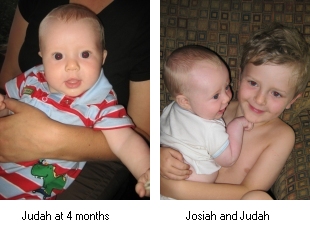
Parashat Eikev - עקב

08.02.09 (Av 12, 5769) The Torah portion for this coming Shabbat (Eikev) includes the famous statement: "Man does not live by bread alone, but from everything that comes from the mouth of the LORD shall he live" (Deut. 8:3). Note that Yeshua quoted this verse when he was tested with physical hunger in the wilderness (Matt. 4:3-4).
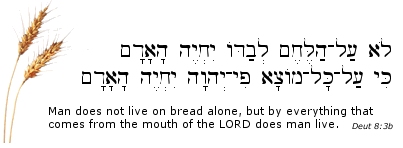
Although physical food helps us survive, we must ask the question, for what end? Do we live for the sake of eating (and thereby live to eat for another day, and so on), or do we eat in order to live? If the latter, then what is the goal of such life? What is the source of its nutrient and where is it taking you? What does your soul or "inner man" feed upon to gain the spiritual will to live?
Both the written Torah and Yeshua (who is the embodiment and expression of Torah) make it clear that we receive sustenance from the Word of God (דְּבַר הָאֱלהִים), the Source of spiritual life. But the word of God itself is a message of the very love of God (אַהֲבַת הָאֱלהִים) that is always sustaining us -- whether we are conscious of this or not. After all, for those of us who understand our brokenness and radical dependence, what "word" could we possibly endure were it not His words of hope, consolation, and even endearment? The Love of God is our life, chaverim, and the love of God is most clearly seen in the life and sacrificial death of Yeshua the Messiah...

God cleaves to us and therefore calls us to cleave to Him in return (devakut). Some scholars think that the Hebrew word for seeing (ראה) and the word for fearing (ירא) share the same root, and therefore we can close our spiritual eyes by not revering the works of the LORD. Similarly, we can close our spiritual ears by not heeding to His words of love for our soul...
Our very spiritual life -- its source and its end -- depends upon receiving the word of the Living God who is King of Eternity (אֱלהִים חַיִּים וּמֶלֶךְ עוֹלָם). He speaks words of hope and love to those who attend themselves to His Presence. May you hear Him speaking to you now!
|
|










































